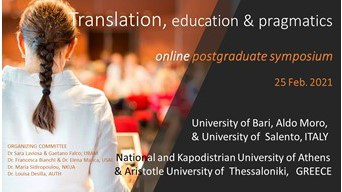Description
Translating profanity and sexual blackmailing in Lysistrata
Alexandros Karavelos
M.A. ‘English Language, Linguistics and Translation’, Specialization ‘Translation Studies and Interpreting’
The study examines the pragmatic phenomenon of profanity in Modern Greek and English translations of the ancient Greek comedy Lysistrata written by Aristophanes. The play is known for its bad language and is a very useful resource for the analysis of how profanity is treated by English and Greek translators of the play during different time periods. The study examines the degree to which offensiveness is tolerated in four translations of the ancient play. Two Modern Greek and two English translations were selected for interlingual and intralingual comparison. The study takes an emic approach to the phenomenon in that it handed out questionnaires with the aim of utilizing the participants’ linguistic insight into assessing degrees of profanity and appropriateness. The elicited data confirmed a higher degree of profanity in the two modern translations and that there is higher tolerance of taboo language in the recent translations vs. the older ones. Another finding concerns the tendency of modern Greek to engage in profanity more often vs. the modern-day English translation. The analysis could advance understanding of taboo language and im/politeness norms prevalent at particular times and cultures, because these norms are reflected in the final translation products.

